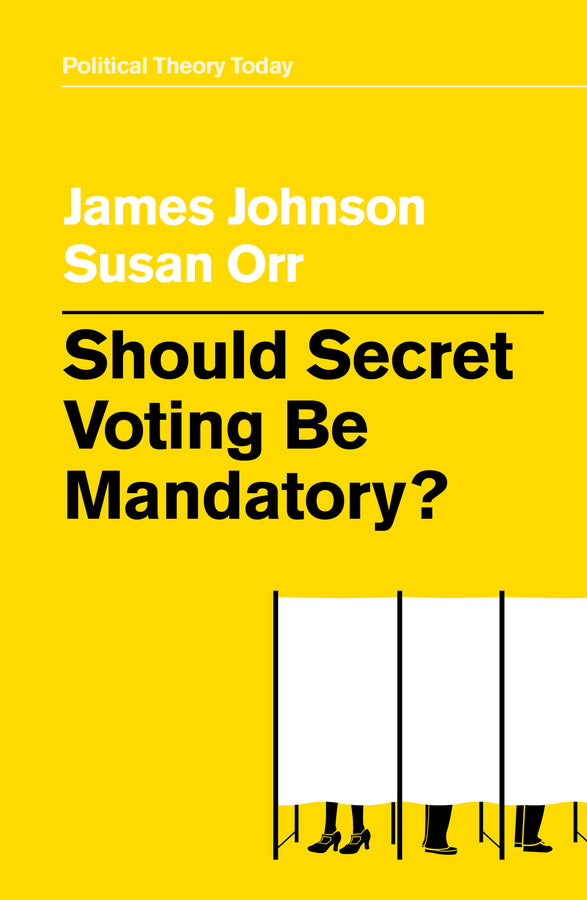Description
Explore the critical debate surrounding secret voting in our thought-provoking book, 'Should Secret Voting Be Mandatory?'. This insightful analysis by leading scholars James Johnson and Susan Orr delves into the essential role of the ballot's secrecy in representative democracy. As turnout declines and practices like the 'ballot selfie' challenge the sanctity of our voting processes, the authors articulate the need for mandatory secret voting to protect voters from coercion and bribery. This book explores the history of voting secrecy, how powerful influences have sought to manipulate voter turnout, and the compelling case for maintaining the integrity of elections through confidentiality. Ideal for students, scholars, and anyone interested in the intricacies of democratic theory and voting behavior, this volume offers a comprehensive understanding of the dynamic between secrecy and freedom in electoral participation. With 140 pages of well-researched content published by John Wiley & Sons (UK) in 2020, it’s a must-read for those who value the principles underpinning democracies. Note: Shipping for this item is free. Please allow up to 6 weeks for delivery. Once your order is placed, it cannot be cancelled. Don’t miss out on securing your copy of this vital resource that contributes to the ongoing conversation about the importance of secret voting in our democratic society.
Note: Shipping for this item is free. Please allow up to 6 weeks for delivery. Once your order is placed, it cannot be cancelled.
Condition: BRAND NEW
ISBN: 9781509538164
Year: 2020
Publisher: John Wiley & Sons (UK)
Pages: 140
Description:
The secrecy of the ballot, a crucial basic element of representative democracy, is under threat. Attempts to make voting more convenient in the face of declining turnout “ and the rise of the śballot selfieť “ are making it harder to guarantee secrecy.
Leading scholars James Johnson and Susan Orr go back to basics to analyze the fundamental issues surrounding the secret ballot, showing how secrecy works to protect voters from coercion and bribery. They argue, however, that this protection was always incomplete: faced with effective ballot secrecy, powerful actors turned to manipulating turnout “ buying presence or absence at the polls “ to obtain their electoral goals. The authors proceed to show how making both voting and voting in secret mandatory would foreclose both undue influence and turnout manipulation. This would enhance freedom for voters by liberating them from coercion or bribery in their choice of both whether and how to vote.
This thought-provoking and insightful text will be invaluable for students and scholars of democratic theory, elections and voting, and political behavior.
Note: Shipping for this item is free. Please allow up to 6 weeks for delivery. Once your order is placed, it cannot be cancelled.
Condition: BRAND NEW
ISBN: 9781509538164
Year: 2020
Publisher: John Wiley & Sons (UK)
Pages: 140
Description:
The secrecy of the ballot, a crucial basic element of representative democracy, is under threat. Attempts to make voting more convenient in the face of declining turnout “ and the rise of the śballot selfieť “ are making it harder to guarantee secrecy.
Leading scholars James Johnson and Susan Orr go back to basics to analyze the fundamental issues surrounding the secret ballot, showing how secrecy works to protect voters from coercion and bribery. They argue, however, that this protection was always incomplete: faced with effective ballot secrecy, powerful actors turned to manipulating turnout “ buying presence or absence at the polls “ to obtain their electoral goals. The authors proceed to show how making both voting and voting in secret mandatory would foreclose both undue influence and turnout manipulation. This would enhance freedom for voters by liberating them from coercion or bribery in their choice of both whether and how to vote.
This thought-provoking and insightful text will be invaluable for students and scholars of democratic theory, elections and voting, and political behavior.

